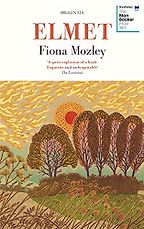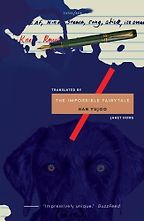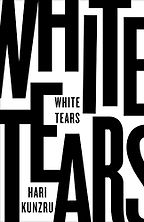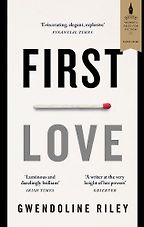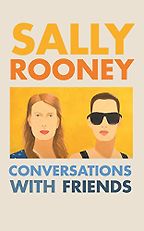Not many people read quite as many novels as you do. What do you hope for in a novel?
I think it’s the combination of really gripping writing, whether that’s beautiful, or whether it’s fast, or whether it’s compelling, or whatever else you want to call it – writing that makes you want to keep reading. That, together with character, for me, drives everything. It’s not the plot that does it. It’s not the turns in the story. It’s actually getting into the head of somebody, and feeling them and being there with them, together with their expression, their voice. That’s what I think makes a strong story – not the story itself, but the voice, the telling of that story.
You used to be the literary editor at the Independent newspaper and have just launched a new online literary magazine, Boundless, so I know you have strong views on this: what do you hope for in a review of a novel?
It’s interesting, because I spent years reading reviews that were commissioned by the Independent, and in those years, I saw all the different kinds of reviews – so I know what I don’t like, which is a review that describes the book, gives you a summary. However classy and elegant a summary, it’s essentially a digested read of the book. That frustrates me, because that doesn’t evaluate – I want a review that really tells me why this book is worth reading, or why it’s really not worth reading because it’s a disappointment.
“We all enjoy a polished novel, written by somebody who’s been polishing their writing for decades, but there’s something really fresh in the titles I’ve chosen, something alive and raw”
Reviews are art forms in themselves and they can be beautifully written, they can make you laugh, and they can provoke as well. They can make all sorts of surprising links. The really sophisticated reviews are those that tell you whether a book is worth reading, evaluating and giving an opinion, at the same time as making interesting connections to films, to other books, across culture. That is the kind of review I think is amazing – one that connects the book, and itself, to the world and to other art forms.
The space that used to be dedicated to that kind of writing has dwindled in mainstream publications. Books pages in national newspapers are now famously few. Do you think part of the reason this has been allowed to happen is because people forgot how exciting critical writing could be, because there was a general softening of the form down the decades? I’m thinking of Elizabeth Hardwick’s argument in “The Decline of Book Reviewing” (1959), where she lambasted the kind of “light little review” that acts as a “hidden dissuader, gently, blandly, respectfully denying whatever vivacious interest there might be in books or in literary matters generally.”
I think there’s something in that argument. Reviews of novels are often shrunk down into a summary and a few soundbites, which does rather undermine our collective interest in books, and doesn’t show us how glorious it is to read.
In my term at the Independent, the pages shrunk. We still devoted quite a lot of space comparatively to the literary pages, but they shrunk and advertising took over, and this is the problem with print media now. Of course, what’s great about non-print digital media is that space is infinite and elastic, and at Boundless, we’re not going to distract people with adverts or any other sort of popup. It’s really just going to be, ‘We don’t believe that you’re into listicles, and you’re not fooled by clickbait. So here is a long piece of writing.’
We did our own research before we launched. We had a development team. It was really interesting what they found. It surprised me, but people really like medium- and long-length pieces online. I didn’t really appreciate that. Overwhelmingly people said, ‘I like reading well-written long pieces.’ I thought that was a rarefied pleasure shared by a few of us literary types – but no, it’s important to all sorts of people. So I thought, ‘Well, then, yes, I am going to ask Boyd Tonkin, a former colleague, to write a very long piece on Susan Sontag and why she’s still relevant.’
The other thing people tend to be downhearted about is the quality of current writing. In fact, a number of the novels you’ve chosen as your best of 2017 are by young debut writers, so that’s that myth punctured.
You know, I’m quite surprised by the five that I chose, because they are some of them by young writers, and debut writers, like you say. And they’re all women, too. Maybe it’s me – maybe I’m actually looking for something different. We all enjoy the sort of polished novel, written by somebody who’s been polishing their writing for decades, but there’s something really fresh in the titles I’ve chosen, something alive and raw, and maybe imperfect. But I like that imperfection. There’s something real and inventive in them all.
When you mentioned the polished novel of a writer, who’s been perfecting his style for years and years, I immediately thought of Alan Hollinghurst, whose The Sparsholt Affair was published this year. One might have expected to see that on a ‘best novels of 2017’ – but we’ve got Elmet by Fiona Mozley instead. 2017 has been a decisive year for her: not only is it her debut and none of us had heard of her a year ago, it also went straight onto the Man Booker shortlist.
Mozley’s book left me breathless, but not immediately. I reviewed it for the London Evening Standard, and so I received a copy in the post and I had never heard of this woman. I knew she was in her late twenties, and I knew that she’d written this book on her commute, on a train, and I thought, ‘Oh God.’ My heart slightly sank, and when I read the first few pages I wasn’t taken – I think the first few pages are a rather strained mediation on the Yorkshire landscape, Elmet being an ancient Celtic kingdom in what is now West Yorkshire. And because she’s a young writer I could hear the strains of canonical writers – a bit of D H Lawrence, a bit of Wuthering Heights in the descriptions of the wind-swept landscape up there. One of her central characters is called Cathy, and I thought, ‘Oh dear, is this going to be a bit derivative?’
Get the weekly Five Books newsletter
But get beyond those first slightly ropey pages, and you get this really odd, wonderful and sad story, about two children who are taken out of ordinary life by their father, who is a fist fighter. He’s this hulking great thing – beautifully described as a sort of superhuman character, because this is how the children see him. We see the world through one of the child’s eyes, Daniel. He’s the son, and Cathy is the daughter. The narration stays with Daniel, a really sensitive boy in awe of this huge man.
So the father takes them out of school and out of ordinary life to give them more options and more freedom. The mother is away, absent, and he builds a home with his bare hands in woodlands. It’s really lovely for a short time, because they’re living in this idyll, and their connection to the land is beautifully described. They live in a way that we stopped living in; they connect to the land in a way that in urban life we just don’t even think about anymore. So the novel is as much about that kind of relationship as it is about the human relationships and drama.
“Mozley knows how to build things up slowly, turning up the tension to the point where we know he is going to burst off the page”
But the father gets embroiled – the land that he’s built their home on is contested by powerful landowners. So there’s that strand, but there’s also the matter of the father’s capacity for violence, and that ripples beneath the surface for a very long time. We know it’s not going to stay there, but Mozley builds things up slowly, turning up the tension to the point where we feel he is going to burst off the page. And we know it’s going to end badly. We know there’s going to be some fatality. As it happens, there’s a huge surprise at the end – you would never guess that things turn out the way they do.
Conveying all of that from the perspective of a child is a difficult task.
I’ve always found novels told in a child’s voice to be filled with an artifice that, for me, rarely works. I don’t buy that voice. Daniel is a very sensitive child, sometimes quite an adult child, making observations that are perhaps too adult. And this is sort of what I meant about imperfections in the books. You forgive them because the writing itself is so beautiful. And in the meantime the tension is turned up so well and so thoroughly – at one point, when I knew something awful was going to happen, I had to put the book down and have a cup of tea, and just sort of calm myself down. Then, once I felt prepared for the violence that was going to take place, I picked it up again.
The main ‘plot’ in a sense, is masculinity itself.
Yes, this is a thrilling book about masculinity and fatal masculinity. The father is often called a Goliath, and he is. But he’s also a bit of a David fighting the Goliaths that are the landowners looking to dispossess his working-class family – so there’s a clever inversion there. Mozley captures a certain kind of masculinity that has been there since mediaeval times – since the days of Elmet itself – and which runs through to Clint Eastwood and that whole cult of the strong, silent, deadly man who we seem to find so attractive, but so horrifying too. The hero of the book is the father, but also the children. The difference is that the father is mired in this violent masculinity, too, so we know he can’t win in the end.
This truly is a beautiful book. As I said, I don’t think it’s perfect, and I don’t think it needed to be. My favourite book, is Emily Brontë’s Wuthering Heights and that isn’t a perfectly written book either – that’s a big part of why I love it. It is a bit sprawling, and a bit all over the place, and melodramatic. Mozely does remind me of that and I can’t wait to see her writing and her storytelling develop.
From a novel in which the father is called Daddy throughout to one about ‘Child’, whose name we never learn: The Impossible Fairy Tale by Han Yujoo. It’s another debut.
Han Yujoo is a young writer from South Korea, and she’s part of this new generation of young Korean writers, following on from Han Kang. We know Han Kang has found international recognition [Han Kang’s novel The Vegetarian, translated by Deborah Smith, won the Man Booker Prize for International Fiction in 2016], but Yujoo is part of the next wave of writers really challenging the literary form. Here you have a book, as you said, where we’re seeing the world not just through the eyes of one child but through the eyes of two children. There’s a school full of them, in fact, but we focus on the very wealthy Mia, and the Child, who is the opposite of Mia. Child is abused at home, and she’s deeply troubled. The novel has this really eerie tone, and it sort of reminded me of stories that I’ve read and loved in the past, which have children as the major menace of the book.
Henry James’s The Turn of the Screw being the obvious example.
Precisely, or more recently Carrie by Stephen King. The Child has all of those elements of the haunting within, and it’s a story about her and about the schoolroom. At lot of it takes place at school, with the child being fairly invisible in it. She has signs of abuse. She has signs of neglect all over her, the bruises and whatnot, and nobody notices, because she’s just a nobody. She’s unfairly invisible. And Mia is this child who’s the opposite of that – you know, she gets everything she wants, she’s pretty, she’s popular. And these two girls end up in a kind of friendship that leads to something really melodramatic, and it’s a turning point, and it’s horrifying, and it’s murderous.
Then, the novel goes off in another direction, and it’s about the writing of these characters. It gets quite metafictive. It’s a device that ordinarily I might roll my eyes at, and think, ‘Oh God. This is immature,’ or ‘I hate being played with. I want to go back to these two girls, and I want to go back to the drama of the classroom.’ But I didn’t feel that here, because the two girls seep into the metafictive genre and they rear up in it as they are being created by the writer. It’s real cleverness on Han Yujoo’s part. That I don’t find her cleverness really contrived and mannered is a testament to her managing to stay just on the right side of experimentalism.
“She toys with reality, crafting scenes that might be real, but could be fantasy or imagined, too – there’s a surreal, hallucinatory quality to it”
She toys with reality, crafting scenes that might be real, but could be fantasy or imagined, too, so it’s a little bit like Han Kang’s The Vegetarian in that sense – there’s a surreal, hallucinatory quality to it. She does that so well. She sucks you into an interrogation of reality, of how much reality is actually out there and how much of it is in our heads.
Her writing is daring. She tells a story – there’s a very strong horror story there, but there’s also real innovation in writing, real innovation in form, and a lot of thought behind it. It’s really dazzling how complicated a book it is, and I’m stunned that somebody so young can write a book with so many layers to it.
She uses form to raise an interesting ethical question too: who has the right to write whose story, and how?
We get an iteration of that in your next novel, White Tears by Hari Kunzru. It sets out to do quite a few things, but cultural appropriation is a main theme, specifically as it plays out in terms of race relations in America. What impressed you?
This is an astonishing novel. I’ll be honest, I’m not usually blown away by Hari Kunzru’s work. I’m always very impressed by it, by its learning, and its complication, and the themes of technology, and all the rest of it – but it usually leaves me cold. This didn’t. And you’re right in the sense that it is about cultural appropriation, and we’ve sort of felt it in the air this year with La La Land, which was criticised for its version of jazz that was nostalgic, and Ryan Gosling was the white man who ‘saved real jazz from being corrupted.’ And this book plays with that idea.
It’s about two white American hipsters, one of whom is very wealthy, and they set up a studio that remixes rare blues records. They’ve got this self-righteous authenticity to their music. ‘This is what real jazz is. This is what we’re doing. We’re giving you the real thing, unadulterated’, and so on. But, basically, it’s a ghost story. One of them records a black homeless jazz musician and, as a sort of prank, they put this out, having remixed this homeless man’s voice, and the give him a name and say, ‘Here’s a new record.’ And someone pops up and says, ‘Oh, yes. I know this record well. I know this artist well. He was big in the 1950s.’ And of course, he wasn’t, because it’s a prank, and they’ve just made it up. But the prank has set off a series of events that lead to a haunting.
So to pull this off, the story goes back to the past, and to the source of the music, which is pre-Civil Rights America, when jazz was saturated with issues around race and oppression – it’s such a heavy legacy. And here we have these two hipsters trying to strip the music of all its history, appropriate it for its aesthetic, just because it sounds so authentic, without really appreciating the weight, the oppression, the context in which it was made. But I don’t want to talk too much more about the story, because it is a ghost story, and it really must be read.
So it’s also a state-of-the-nation novel.
Very much so. It’s a state-of-the-nation novel about an America that often tells itself it has moved on from centuries of white oppression of African-Americans, and Kunzru’s novel points to all the ways in which it hasn’t and can’t. You can’t clinically strip history from the music and enjoy it for its aesthetic alone. The novel says so much about history, culture, appropriation, and music.
Could you tell us about the novel’s own aesthetic? Because it’s quite straightforward and well-paced for a while, isn’t it, but then there’s a twist, and the register shifts…
What I found about this novel was, as opposed to Kunzru’s former work, is that it has a sort of clarity. There’s a real narrative drive, too. Because it’s a ghost story, a lot happens, everything moves quite fast, and it has a fluidity.
But then you get to a point – I think it’s about two-thirds of the way into the novel – where the register does change and it goes kind of murky so that you don’t know what’s real and what’s not. It gets convoluted at one point, and I admit to feeling rather disappointed by the ending because it’s such a fantastic story, and you’re thinking ‘How is this going to finish?’ But again it’s an imperfection that I don’t think matters because we’ve already got so much out of it all.
For your fourth book we’re moving from cultural violence back to domestic violence, albeit of a different, more subtle kind to what we’ve discussed so far. Tell us about First Love by Gwendoline Riley.
A woman in her thirties called Neve is married to an older man called Edwyn; she’s a writer and so she studies her marriage, and Edwyn with the forensic eye of one. The marriage feels and sounds like an oppressive one, with both Neve and Edwyn made miserable in it. I grew to hate Edwyn who comes across as a needy and childish man despite his age, but I think we are supposed to feel both needled by what seems like his bullying of Neve, but also their tenderness towards toward each other, in spite of, or alongside, the oppressive elements of their intimacy. We only see things from her point of view and there are these tiny clues that Riley drops as to the ways in which Neve shuts Edwyn out, or torments him in her own way. The novels speaks so clearly, and so chillingly, about the hard edges of intimacy.
This is Riley’s fifth novel. How does it compare to the rest of her work?
It has some of the same inquiries into the meaning of love, the meaning of intimacy. Whether we always stay unknown or only half understood to our lovers or partners or husbands. Just like the others, this has a female protagonist who is also a writer at its heart, and a woman with the same kind of damaged family – a bullying father, an unreliable mother, and there is something deeply lonely about the central character, though it is made clear that she chooses to be alone, and prefers it that way.
“The novels speaks so clearly, and so chillingly, about the hard edges of intimacy”
So this book does a lot of the things that the previous ones do, but there is something magical that happens in this one, and I found it so much more beautiful, painful and powerful. It’s definitely her best book yet – poetic, spare, forensic and unforgiving in its observations, all at once.
Again, the portrait of masculinity is compelling and complicated. How does Riley build character?
She does it through incident and dialogue very well in this book. Edwyn is shown as unreasonable through his words and his actions. Riley’s protagonists are always keen observers of other people and so Neve is here, recalling dialogue from years ago, making connections between her father’s behaviour and Edwyn’s. She’s an intelligent protagonist, and it’s all very psychological territory in her character portraits. Men on the whole have been distant and inaccessible in her books, and here, although I detested Edwyn, he is perhaps the one who reveals most about what is going on in his head. He is the most confessional and communicative, strangely.
Your final choice, another debut, is Conversations with Friends by Sally Rooney, who has, incidentally, been compared to Riley.
I can see why – they both interrogate love, their characters are writers, they are young women who have a yearning and a sense of aloneness. They are keen observers of the world.
What about Rooney’s writing impressed you?
I loved how she used the blueprint of the love triangle – two young gay women get emotionally, and sexually, embroiled with an older, more urbane couple in Dublin – in a way that made it seem fresh and unexpected. Nothing feels clichéd or familiar. She is so strong on dialogue and there is something both youthful and deeply mature in her writing. It’s really exhilarating to read a debut that’s so good.
Is it too soon to say what you’re looking forward to reading in 2018? Which of these writers’ next novel are you most eager to hear word of?
I want to read whatever Fiona Mozley produces next. She is already working on her second novel and I bet it’ll be worth reading. I’ve got some other 2018 reading already lined up though: I’m looking forward to Louise Erdrich’s new book, out in January, called Future Home of the Living God. Also a book that’s making waves in Europe, Lullaby by Leila Slimani. It won the Prix Goncourt and it’s about a middle-class French-Moroccan couple whose baby dies in the care of a nanny. It sounds a bit like Michael Haneke’s film Hidden on the same themes of middle-class lives, race and crime.
Five Books interviews are expensive to produce. If you're enjoying this interview, please support us by donating a small amount.
Five Books aims to keep its book recommendations and interviews up to date. If you are the interviewee and would like to update your choice of books (or even just what you say about them) please email us at [email protected]
